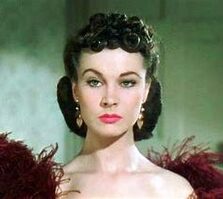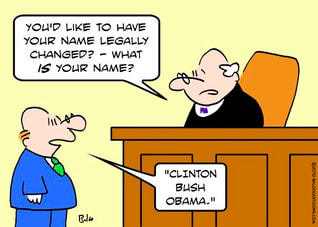Think about it! There will be certain ones from movies, TV, books, video games, etc. you always remember. What makes that character come to your mind.
Image Source: vagabomb.com/Scarlett-OHara/

My apologies to all the Judy Smiths out there. It’s a perfectly fine name.
There is a plethora of advice wandering about on the internet and in teachers’ notes on the art of naming fictitious characters. Most of the experts agree that choosing names for characters is an important part of structuring a novel; they don’t necessarily agree on how to do it. The name is an important part of the fictional person's personality just as your name is part of who you are.
In a work of fiction, character names do matter, and bestowing them can be as stressful as naming your baby. In fact, in a way you are naming your baby. You are breathing life into your character and creating a new being.
Some perfectly good names can be poor choices for your novel, or they may be fine but not as fitting as they could be. The author really doesn't know all the ins- and-outs until the character starts to speak, take actions, and make decisions during the course of the first several chapters. Ultimately, the author wants the best and most effective name for the character.

Jennifer Moss, author and journalist, writes that authors often make the mistake of thinking they are responsible for naming the characters in their novel. But in the fictional world, just as it is in the real world, it is the character's parents who choose the name. Take that into consideration, as well as the location and timing of the novel.

Be observant, listen, and write ideas down. Inspiration for names is all around us. I keep a list of interesting names I've run across. Often they are the names of real people, sometimes inanimate objects, places or landmarks. Eventually, a character and circumstance will show up that is appropriate for the name.
Author Dan Schmidt suggests starting with people you know either because of their interesting names and/or characteristics. Get a map and look at names of towns, cities, rivers, streets, and so on. One of my favorites is the name of a town in Arkansas: Smackover. Weedpatch is another one I like.
He also suggests authors pay attention to movie credits and products. When he wrote "Playa Perdida" he named one of the characters Charlotte Pipe after a length of PVC tubing he saw in a lumberyard in North Carolina.
His approach is to write first names and last names on separate index cards, so later you want match them up for a specific fictional character. Many authors keep lists of one sort or another. One author suggest looking at SPAM for unique names. Also check out the people on facebook who want to friend you.

Most of the many articles and books I reviewed suggest basic "Rules of Thumb" for naming characters, and from one to the next they are substantially the same. Do's and Do Not’s are essentially two sides of the same coin; it all depends on how you word the sentence. BTW, no one is telling an author that they “must” do or not do. This is only advice.
The best Rule of Thumb for writers is the author can do anything, as long as it works.
As you go through your thinking process to begin a new novel, you usually have seceral characters in mind, and possibly some potential names for them. Don’t just go with that. Do your homework, research the names, and get them right.
● Check out the root meaning of the name.
Readers may not know the meaning of the name Fredrick is “rich, powerful ruler” but some may. If that is not the impression you want the reader to get about the character, Fred is probably not the best choice. Or you could set up a contradiction if that works for the novel. That’s okay if you do it on purpose and for a reason.
● Google the names you are interested in.
Maybe the murderer in your mystery novel will turns out to be a real person who won’t like being cast as a blood thirsty serial killer. Note that the bad guy in a mystery usually doesn’t have a middle initial to avoid at least one pitfall if the name turns out to be real. Or it could be the name you want for your sweet innocent heroine turns out to be the name of popular porn star.
● Don’t try to fake foreign and historical names.
Remember, most babies are named by their parents, who probably know how to spell and put the name in proper form. First, determine if name is in the correct language. This is a pitfall if you have characters with foreign names. If your character is Chinese, be sure you're using a Chinese name, not Japanese. Second, be sure you spell it correctly.
Third, be sure of the proper format for that country's language. Not every culture puts the given name first and the surname at the end. In Asian languages, the surname comes first, followed by the first or given name.
On the other hand, Russian names are made up of three parts: first name, patronymic, and surname. As a rule, Russian male names end in a consonant, and female names end in an ‘a’ or ‘ya’. The middle name, or patronymic, is created by taking their father’s name and adding the ending -ovich/-evich for boys, or -ovna/-evna for girls, the particular ending determined by the last letter of the father’s name.
Hispanic countries hyphenate the mother’s maiden name and father’s surname. The ancient Romans didn't often use first names. Check and double check.
● Get the Era Right.
Make the name appropriate for the year and location when the character would have been named. Take into account the names used at the time in history when this character would have been named. Look at your choices in the context of the location and social station. Take into account the character's ethnicity and national origin. Again, double check it.

● Keep names short and pronounceable, even in Science Fiction, Fantasy, and Historicals.
Avoid character and place names that are awkward to read or pronounce. Even if readers don't say the names out loud, they still pronounce them in
their heads.
Some awkward names cannot be avoided if you use them in a historical context. Sometimes scenes are set in one-of-a-kind locations that are vital to the story but happen to have clunky names. Give them nicknames or shortened versions, but only if it works.
● Think about your character's physical appearance, ethnicity, personality, profession, interests, social status, and backstory.
Names should suit the character. Unlike Parents naming a new baby, authors have the advantage of making the character's features and personality whatever they want to fit the story. You do not want to set up false expectations, unless that is a plot twist. For example, someone's brother is nicknamed "Shorty", but he turns out to be six feet seven inches when the heroine finally meet him.
● Speak the name out loud.
● Give siblings the same style of names.
An example would be all biblical names. Another, is naming sisters all after flowers. You also can begin each name with the same letter or sound, but that's risky and can cause confusion for the reader.
● Names should suit the character’s personality
If the character is to be quite strong-willed and stubborn, strong sounds like "k" and "p" will pick up well here. On the other hand, if your character is pretty and a bit shy, soft sounds like "f" and "s" work much better..

In my opinion, there are no specific Do Nots. In fiction you will see everything in print and much of it could be characterized as "Don't" or "Never Use". Therefore, I characterize these rules of thumb as "Watch-Out-For".
● Watch out for a character with too many names.
Because the author knows the characters, he can read the manuscript many times without seeing any problem with multiple names. In reality, we often use different names for the same person under different circumstances, or different people refer to the same person by another name or nickname.
In real life, a man named Manfred Carlyle McDonald, who is a lieutenant in the military and is also a medical doctor, could be referred to as Mr. McDonald, Doctor MacDonald, Lieutenant McDonald, McDonald, Manny, Mac, Fred, or all of those, including Dad from a child.
In fiction, the reader tends to associate the character with the name used to introduce him/her. When that same character shows up again, sometimes many pages later, and is referred to or addressed by another name, it can be very confusing. I can't stick to one name throughout a novel, but can usually limit the names to two or three.
● Watch out for many characters with similar names.
Authors are smart enough to figure out that two characters shouldn't have the same name. The only exception I can think of would be a child named after a parent, but that would have to be necessary for the storyline.
A more frequent problem occurs when two or more characters have names that begin with the same letter [Sam and Sydney] or same sound [Craig and Greg]. This is particularly annoying to the reader if the two characters spend a lot of time together in the story.
● Avoid famous names
Unless your novel is the fictionalized version of a real event that involves a famous person, famous names are distracting and focus the reader's attention on the famous character – and not the fictitious character -- which pulls the reader out of the story. Also, using a real name may have legal consequences. It can work as a plot device, or if the parents had a reason for naming their child after someone famous, but be careful.
● Avoid trends, overly strange names, and androgynous names.
Sometimes names are trendy, particularly those of characters in current movies, TV, video games, etc. Those become overused.
You want names readers accept and feel comfortable with, even though "cute" spellings exist, particularly today. Watch out for names that could be either gender, unless there is a specific reason which is explained near the beginning, or at least at the same time as the second character is introduced.
● Watch out for the man or woman with no name.
Not every character needs a name. Giving a name to a secondary character or "walk on" usually implies that this person will show up again in the novel, and play a role in the story. However, the main character's wife cannot be repeatedly referred to as "his wife" nor can an important character be referred to only as "the man." There might be some exceptions in the mystery genre where the author doesn't want the readers to know who the "bad guy" is.

Some potential problems with names in SciFi and fantasy don't occur as often in other genres. When writers have more freedom to create character names, they also have more potential for making mistakes. The biggest Watch-Out-For is long and/or unpronounceable names.
The other trend in Sci Fi and Fantasy that annoys readers is the use of t'oo m'any ap'ostrph'es. [Author Ann Marble calls these "The Ap'ostrph'e of D'oom."]
NAMES CAN BE CHANGED
Computers make changing a character's name somewhat easy, but once an author starts using a name, it's often hard to get rid of it. If the name doesn't work, or has some unforeseen connotation you don't want, don’t be afraid to ditch it. You are not really killing your children.

JUST SAYIN’ !
■
Sources:
2022
https://www.writermag.com/improve-your-writing/fiction/naming-fictional-characters/
https://annerallen.com/2021/04/naming-fictional-characters/
https://thenovelsmithy.com/naming-fictional-characters/
https://themobilewallpaper.com/beautiful-japanese-girl-innocent-looks-nice-mobile-wallpaper
https://carnewschina.com/2014/01/10/pretty-chinese-girl-is-very-happy-with-bmw-320li/
https://www.babynamespedia.com/etymology/m
https://hellogiggles.com/celebrity/princess-diana-finally-getting-holiday-name-perfect/
https://www.thefamouspeople.com/profiles/arnold-alois-schwarzenegger-757.php
https://www.pinterest.com/pin/454089574925625276/
https://kidnurse.org/whats-name-everything/
https://www.writersdigest.com/write-better-fiction/the-7-rules-of-picking-names-for-fictional-characters#:~:text=The%207%20Rules%20of%20Picking%20Names%20for%20Fictional,appropriately.%205%205.%20Use%20alliterative%20initi
2017
http://www.writersdigest.com/online-editor/the-7-rules-of-picking-names-for-fictional-characters
http://onceuponaword1.blogspot.com/
http://thewritepractice.com/8-tips-for-naming-characters/
http://www.wikihow.com/Name-Your-Fictional-Character
http://www.obsidianbookshelf.com/html/fantasycharacternames.html
ttp://www.theweeklings.com/golear/2013/10/08/the-50-greatest-literary-character-names-of-all-time/
http://www.writing-world.com/romance/names.shtml
http://www.writing-world.com/romance/lindo.shtml
http://www.writing-world.com/sf/crafting28.shtml
http://www.writing-world.com/fiction/namegame.shtml
http://www.namenerds.com/uucn/listofweek/nobility.html
http://characternames.com/
http://www.babynames.com/lists/character-names.php
http://www.be-a-better-writer.com/character-name-generator.html
http://www.whoisjaylamm.com/2015/06/11/stop-naming-your-kids-after-fictional-characters/
http://www.writersdigestshop.com/the-writers-idea-thesaurus-group?utm_source=writersdigestshop.com&utm_medium=referral&utm_campaign=wd-bak-fb-150827-ideathesaurus





 RSS Feed
RSS Feed